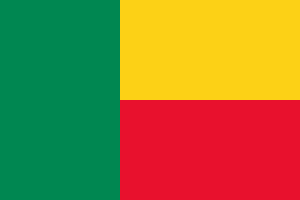Difference between revisions of "Language/Fon/Grammar/Questions"
m (Quick edit) |
m (Quick edit) |
||
| Line 9: | Line 9: | ||
__TOC__ | __TOC__ | ||
<span link>With the completion of this lesson, consider investigating these related pages: [[Language/Fon/Grammar/How-to-Use-Be|How to Use "Be"]], [[Language/Fon/Grammar/Give-your-Opinion|Give your Opinion]] & [[Language/Fon/Grammar/Pronouns|Pronouns]].</span> | |||
== Basic Question Words == | == Basic Question Words == | ||
In English, there are five basic question words: who, what, where, when, and why. In Fon, there are four basic question words: tɔ̃́, nù, blí, and ngwɛntɔ. Here is what they mean: | In English, there are five basic question words: who, what, where, when, and why. In Fon, there are four basic question words: tɔ̃́, nù, blí, and ngwɛntɔ. Here is what they mean: | ||
| Line 79: | Line 81: | ||
}} | }} | ||
==Other Lessons== | |||
== | |||
* [[Language/Fon/Grammar/Pronouns|Pronouns]] | * [[Language/Fon/Grammar/Pronouns|Pronouns]] | ||
* [[Language/Fon/Grammar/Plurals|Plurals]] | * [[Language/Fon/Grammar/Plurals|Plurals]] | ||
| Line 91: | Line 92: | ||
{{Fon-Page-Bottom}} | {{Fon-Page-Bottom}} | ||
<span links></span> | |||
Latest revision as of 21:02, 27 March 2023
Hi Fon learners! 😊
In this lesson, we will learn how to ask questions in Fon. Questions are a fundamental part of any language, and Fon is no exception. Learning how to form questions correctly will allow you to communicate more effectively and have more meaningful interactions with native speakers. We will also provide you with cultural information and some interesting facts along the way. So, let's get started!
With the completion of this lesson, consider investigating these related pages: How to Use "Be", Give your Opinion & Pronouns.
Basic Question Words[edit | edit source]
In English, there are five basic question words: who, what, where, when, and why. In Fon, there are four basic question words: tɔ̃́, nù, blí, and ngwɛntɔ. Here is what they mean:
| Fon | Pronunciation | English |
|---|---|---|
| tɔ̃́ | tone | who |
| nù | nu | what |
| blí | bli | where |
| ngwɛntɔ | ngwento | when |
It is important to note that Fon has no direct equivalent for the question word "why." However, you can use the phrase "kpá à hɛ" to ask "why" in a roundabout way. This phrase directly translates to "for what reason."
Basic Yes/No Questions[edit | edit source]
Yes/no questions are questions that can be answered with "yes" or "no." In Fon, these types of questions are formed by adding the particle "nú" to the end of a statement. Here is an example:
- Statement: Mí dó dé. (I am going home.)
- Question: Mí dó dé nú? (Am I going home?)
The particle "nú" corresponds to the English word "right," and is often used to express surprise or disbelief, even in statements that are not questions. For example: "Mí dó dé nú! (I am going home, right!)"
Using Basic Question Words[edit | edit source]
To ask a question using the basic question words we introduced earlier, simply add the question word to the beginning of a statement. Here are some examples:
- Tɔ̃́ lá bǒn? (Who is coming?)
- Nù là fó̌n? (What are you doing?)
- Blí là nàwɛ́r? (Where is the market?)
- Ngwɛntɔ làkí èn? (When did you arrive?)
Question Words with Special Particles[edit | edit source]
In Fon, there are some question words that require the use of a special particle to form a question. Here are some examples:
- Kpàtà: This word means "how." To ask a question using "kpàtà," add the particle "wú" to the end of the word. For example: Kpàtàwú lɛ́? (How are you?)
- Nù ʋtòn: This phrase means "what time." To ask a question using "nù ʋtòn," simply add the phrase to the beginning of a statement. For example: Nù ʋtòn là dó dè? (What time are we going home?)
- Blí kɛ̀: This phrase means "where to." To ask a question using "blí kɛ̀," simply add the phrase to the beginning of a statement. For example: Blí kɛ̀ là dó dé? (Where are we going?)
Dialogue[edit | edit source]
- Person 1: Mi lá blí? (Where am I?)
- Person 2: Tɔ̃́ mi tí? (Who brought you?)
- Person 1: Mi tí là Yáyá. (Yaya brought me.)
- Person 2: Nù dò tè? (What do you want?)
- Person 1: An kè mètè. (I don't want anything.)
Cultural Notes[edit | edit source]
In Fon culture, asking questions is often seen as a sign of respect and interest in the person you are speaking to. It is also a way to establish a deeper connection with someone by showing that you value their thoughts and opinions. Additionally, Fon has a rich tradition of storytelling, and asking questions can be a way to learn new stories or traditions from older generations.
Interesting Facts[edit | edit source]
- Fon is spoken by around four million people in Benin and Togo. - Fon is a tonal language, meaning that the pitch of a word's pronunciation can change its meaning. - The Fon people have a unique writing system that uses special symbols to represent sounds and meanings.
To improve your Fon Grammar, you can also use the Polyglot Club website. Find native speakers and ask them any questions!
